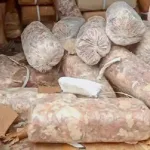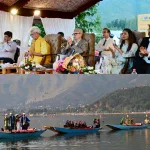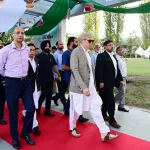External Affairs Minister Dr. S. Jaishankar while speaking at the Asia Policy Institute in New York had recently underlined India’s difficult history with China. He was linking it with the Chinese troop movement to the Line of Actual Control (LAC) in 2020 in spite of the explicit agreements with India. Dr. Jaishankar also underlined that 75% of the border dispute has been sorted out and the only issue that persists is that of disengagement. Dr. Jaishankar’s statement has been comprehensively analysed by the Rising Kashmir in its previous editorial published on 30th September. His statement brings to the fore the Indian foreign policy measures with respect to China and India’s perception regarding the security of the Northern Frontier. Indian Army Chief General Upendra Dwivedi has also spoken on the same lines and shed some interesting light on the India-China relations and the actual situation on the LAC as far as Eastern Ladakh is concerned. He has said that the situation along the LAC with China is stable but was not normal. He termed the situation as “sensitive”. He was speaking while responding to a question during a seminar “Chanakya Dialogue”. He said that India wants the restoration of the pre-April 2020 situation. He underlined the listing of the various pending issues that include the troops on ground, buffer zone along the LAC and the resumption of troop patrolling. In his opinion the normalisation of the situation depends on the restoration of the pre-April 2020 situation. If that situation is not restored then the situation is going to remain sensitive and the Indian Army is fully prepared to face any kind of contingency to safeguard the territorial integrity of the Indian nation. He attributed this situation to the trust deficit. As the trust has become the biggest causality in the India-China relations. Reacting to the response from the Chinese side in terms of convergence on the issues, the Army Chief said that there is signalling from the diplomatic side that gives options and possibilities. But these can be converted to tangible things on ground only when execution on the ground is materialised and it depends on the army commanders of the both neighbours. His position with respect to progress of talks between India and China, he has said that the both sides have been indulging in the diplomatic parleys and there has been a significant progress leading to resolution of issues that was immediately possible. It is clear from the position taken by the Army Chief that there is an urgent need to tackle the issue between the military commanders who are present on ground zero and monitoring the situation. Though diplomatic parleys are undergoing, the resolution of the tangles will depend only when the Army is satisfied. He underlined the pending disputes at Despang and Demchok that are crucial for upholding the Northern Frontier. As far as China is concerned, the Army Chief has said that India has to internalise “with China you have to compete, you have to cooperate, you have to coexist and you have to confront and contest.” This is indeed a very important strategic mantra and advice offered by the Army Chief when it comes to dealing with an adversary that needs to dealt with both conventional and non-conventional ways. He also expressed his views about the construction of villages along the frontier with India by China. He termed this as a process of creating artificial immigration as there is no Chinese or Tibetan population close to LAC. This artificial settlement is indeed a very sensitive issue that needs immediate redressal. He has rightly pointed out that the “aspect of model villages may look simple, but it may have grandiose design behind it. “When seen in totality both the EAM Dr. S Jaishankar and the Army Chief General Upendra Dwivedi have underlined the fault lines that India is face to face on the Northern Frontier. There is an immediate need for a comprehensive policy that amalgamates the diplomacy and the operational realities to checkmate the Chinese designs to alter the situation at the LAC. India can’t afford to stretch this situation too long. The Indian strategic and security grid must view these observations and remarks with far sight and act decisively to safeguard the national interest. As the territorial integrity and sovereignty of the Indian nation is non-negotiable.
Situation with China is Sensitive

Sign Up For Daily Newsletter
Be keep up! Get the latest breaking news delivered straight to your inbox.
By signing up, you agree to our Terms of Use and acknowledge the data practices in our Privacy Policy. You may unsubscribe at any time.
Leave a Comment Leave a Comment
Stay Connected
Latest News
Recent Posts
- J&K govt warns meat sellers, e-commerce platforms to comply with food safety rules
- Youth voices now roar in stadiums, not streets: LG Sinha
- JKP at forefront in fight against human trafficking: Spl DG Coordination
- Khelo India Water Sports Fest marks new era for J&K youth: CM
- Woman’s death in Shopian sparks protests in Anantnag







